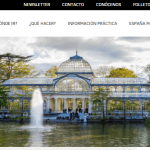The degree of digitalisation of tourism SMEs in Spain stands at 31.2%, considered basic, according to the first study on the digitalisation of small and micro tourism enterprises in Spain prepared by SEGITTUR with support from KPMG and the collaboration of the tourism sector.
To enhance the visibility of the outcome of the study and the guide of recommendations prepared to improve the degree of digitalisation, to get to know the opinion of experts and allow SMEs to participate in the self-assessment process, the website www.pymeturisticadigital.es has been set up, containing all the relevant information.
The study analysed eight aspects of the company where digitalisation is key, such as business vision, innovative product, experience, marketing and sales, business operations, administrative process, talent and digital systems.
From the eight areas subject to analysis, marketing and sales is where the degree of digitalisation of tourism SMEs was highest, with 37.3%, followed by staff talent (36%), business vision (35.1%), experience (34.2%), digital systems (33.3%), innovative product (29%), business operations (22.8) and administrative processes (21.8%).
When analysing the degree of digitalisation by subsector, the report reveals that SMEs dedicated to vehicle rental are the most advanced, on 35.50%, followed by travel agencies (34.40%), tourist activities (33.10%), accommodation (29.10%), restaurants (29.80%) and transportation by bus (25.30%).
Barriers
The relevant barriers that SMEs come up against when going digital include but are not limited to: limited training and skills for defining and developing a business digitalisation model, insufficient economic resources for accessing competitive levels of digitalisation, lack of technological models in the market that facilitate digitalisation based on pay-per-use cloud platforms, lack of knowledge of data management and analysis as a driver for customer acquisition.
Recommendations
Having analysed the degree of digitalisation of tourism SMEs and micro-SMEs and having identified the main barriers, a guide of recommendations has been prepared to provide companies with guidance to move towards a higher level of digitalisation, both at a general level and for each subsector.
To this end, it is worth noting that the proposed recommendations include the need to improve the positioning of companies in their digital marketing strategies that forward traffic to their website and maximise the conversion rate; the installation of reservation systems that are integrated with sales channels as well as updated management systems integrated with all business areas to improve assistance and the tourist experience.
Furthermore, the proposal has been made to seek new tools and technologies for employees and to provide continuous training.
Next Generation funds
One of the challenges that SMEs face in their digitalisation is the lack of financing. To this end, it should be noted that grants linked with EU Next Generation funds will be a key lever in the digital transformation process for small and micro tourism enterprises in Spain.
Methodology
To undertake the study, more than 2,500 tourism companies from the six most relevant subsectors of tourism (accommodation, travel agencies, activities, restaurants, rental vehicles and bus transport) have taken a digital survey containing questions about their degree of digitalisation.
Furthermore, more than 40 tourism and technology companies participated in seven discussion groups, representatives from each subsector and experts in digitalisation and innovation were interviewed, including Javier Rodríguez Zapatero, Chairman of the ISDI; Inmaculada de Benito, Director of Tourism at the CEOE; Nathalie Picquot, Director of Global Marketing at Banco Santander; or John Mora, Deputy Chairman of the AMETIC Smart Cities Commission.
Collaboration with the tourism sector has been key in achieving the participation of companies in this first report, which marks the starting point and a roadmap for promoting the digital transformation of the tourism sector, a key element in improving the competitiveness of tourism In our country.





